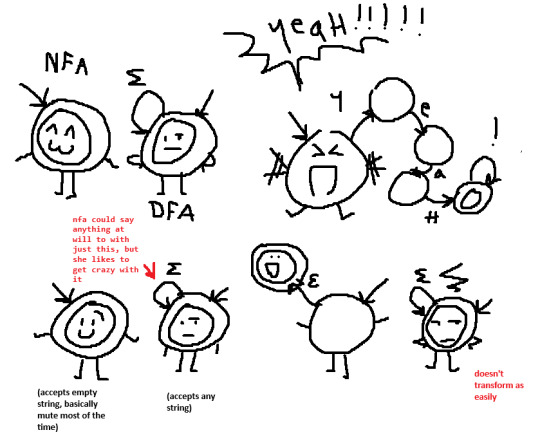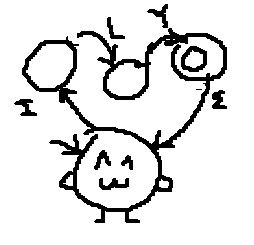#direct objects
Explore tagged Tumblr posts
Note
Hola, I wanted to ask for a clarification on something. I think I confused myself with reflexive verbs and gustar and verbs like it. Reflexive verbs use the "me/te/se/nos/os/se", but gustar uses "me/te/le..." etc. Because a reflexive verb is usually an action being done to yourself, we use se. But why don't we use se for gustar? Or le/les for reflexive verbs? I'm a little lost trying to understand why they're different.
What you're asking is the difference between a reflexive and an indirect object; and I'm going to start with a reflexive because I find them easier to understand
A reflexive is when the subject and object are the same - something one does to themselves (or in reciprocal/plural, something multiple people do to each other)
The basic example that I always like to use is lavar "to wash" - you can lavar la ropa "wash clothes", and lavar a alguien "to wash someone", and in this case the "clothes" and "someone" are considered direct objects [things that receive the action of the verb, as in, the clothes are what is getting washed etc]
A reflexive would be lavarse "to wash oneself"
You have lavarse las manos "to wash one's hands", literally "to wash oneself the hands" - the idea being that it is yourself, the hands are just part of you and obviously part of you (this is a thing that happens with many body parts where ownership is considered implied) - so you are the one washing and the one being washed. That's reflexive. And what is being washed is "the hands", which are the direct object here
Please note - there are other ways reflexives are used, and specifically times se shows up that aren't truly reflexive, and I don't want to confuse you or bog you down with more information than you need but just be aware there's the basic true "reflexive", and then also there are times when se shows up for seemingly no reason and it's just grammatical quirks of Spanish
-
An indirect object (also called dative in linguistics and languages with case systems, like German, Latin, Russian etc) is to mark who is the intended recipient of an action, who is benefiting, who something is done for
"to whom or for whom something is done"... that's why it's indirect
[Note: "who" is often a subject, "whom" is an object; if you take German you'll see this more but it's one of the carry-overs from German just in English as far as "whom" taking an extra letter]
You do something to something (directly), but it's for someone else... so that's why it's indirect
A common example I use is mandar la carta "to send a letter", the one "sending" is the subject, the "letter" is the object... but who is it going to?
le mando la carta "I am sending the letter to him/her"... where the "him/her" is receiving the action of sending the letter but not being acted upon directly... an indirect object
-
Here's where we get into the double-edged sword of gustar
On the one hand, super common absolutely everywhere, needs to be taught
On the other hand, it is often taught as "to like" which is basically true but becomes confusing for people later on when they come across the indirect objects. Teachers do their best to mitigate it but it's kinda unavoidable
gustar is NOT "to like" when used with indirect objects; it is "to be pleasant to" or "to be pleasing to"
When you say me gusta el libro "I like the book" what you're actually saying is "the book is pleasing to me"; and me gustan los libros "I like the books" is "the books are pleasing to me"
This is why gustar is showing up in 3rd person - they're the true "subject" and that's why gustar is often conjugated like this
This also extends to gustar-like verbs like fascinar, apetecer, interesar, importar, preocupar, and so on...
As in me sorprende is "it surprises me", literally "it evokes surprise in me"
...
To be clear here - a reflexive is when the subject and object are the same
Direct object and indirect object phrases are not phrased like that. Direct objects have one subject acting on something [mandar la carta for example], and indirect objects mention who benefits from something being acted upon [mandar(le) la carta (a alguien)]
A reflexive would have you doing the action and being the recipient, so in theory you could say me mando una carta "I send myself a letter"
Many verbs can be reflexive if they apply to the subject; if they apply to someone else, they're often direct or indirect objects
While not super common, me gusto can be used as "I like myself"
-
Also just to be clear about the object pronouns:
Direct objects: me, te, lo/la, los/las, nos, os
Indirect objects: me, te, le, les, nos, os
Reflexives: me, te, se, nos, os
For yo, tú, nosotros/nosotras, and vosotros/vosotras the objects are the exact same
Which means that ~in general but not always~ you don't have to worry too much about whether a sentence is technically direct or indirect
The big issue is 3rd person (+ usted/ustedes which conjugate like 3rd person) - whether it's going to be lo or le or se
In general though it will depend on the context of the sentence. As an example alegrar "to make someone happy" uses indirect objects, while alegrarse is "to become happy"
Whether you're saying le alegra "it makes them happy" or se alegra "he/she is happy/they are glad"
-
Also for more information:
Anatomy of Spanish: Direct Objects
Anatomy of Spanish: Indirect Objects
#learning spanish#spanish grammar#spanish#language learning#spanish language#asks#long post#la gramatica#direct objects#indirect objects#reflexivos#langblr#languages#language
28 notes
·
View notes
Photo

Ron Arad Concrete Stereo 1983
1K notes
·
View notes
Text

and now where the hell is he looking
#This is so funny to me like what else would he be looking at#No one else in this photo is looking in that direction like they’re looking slightly off in the distance but he’s like fully head turned#I can see the fucking face he’s making in my mind#Also just objectively hilarious photo to not see his face but the stupid fuckass mohawk#cobra kai#binary boyfriends#hawkmetri#eli moskowitz#Obligatory “he wants that cookie so effing bad”
88 notes
·
View notes
Text
Rune and Vast are very “soft love.” They’re gentle and sweet with the ones they love and desperately avoid seeming pushy or controlling.
Atlas, on other hand, is more “tough love.” Still gentle, but he’s much more willing to be assertive and even aggressive with his love (especially when those he cares about are neglecting their health and safety.)
For example: someone hasn’t been sleeping.
Rune and Vast will lure them to bed with soft words and fluffy promises of cuddles and kisses.
Atlas will pick their ass up and carry them to bed, and proceed to lie on them until they fall asleep. Or at least actively guard the door to block off any escape.
#sky bound smp#bound smp vast#bound smp rune#bound smp armor#a disco post#this in direct opposition to their teaching styles#where atlas is much more unsure and gentler#and vast is objectively terrifying#bound smp
95 notes
·
View notes
Text

จระเข้ + ตะเกียง airy and american alligator
#hfjone#onehfj#object show community#hfjone airy#airy holding directions#airy hfjone#crocodile#alligator#did a twitter poll.The masses agreed he was an american alligator#alligator took me a week to finish not because it was hard(it was) but because im lazy
259 notes
·
View notes
Text
I hate the stretch lines in the front of Curly's uniform because that means the devs rushed to make a model in like a month or so and thought "They gotta at least know he has huge knockers, gotta know he's got back pain." Cause like what is the thematic importance of his tits having overhang?
What responsibility is that representing? Breast reduction? It shows an inherent greed in his character due to the excess and heshouldletmeholdone and that he clearly is blinded cause if he tries to look down his damn ladder all he's seeing is his own cleavage.
#this is my curly slander post ig#disclaimer i need you to understand i see all fictional men i like as like butches Curly is no exception#but like they didnt need to add that many polygons to his chest like its unnessary and honestly a little mean he already has so many things#to handle and you expect him to hold those boys up like that just aint right this is like something so stupid but i know you can tell im#having strong feelings about it cause like what was the point why did they survive the fucking crash it has to be a injoke at this point#with the devs it shouldnt make me this mad im turning into a misandrist but only towards large chested men#mouthwashing#curly mouthwashing#shitpost#suggestive#ig because this is just about his chest but like also they made him objectively pretty for no reason like yeah like ideal man and work ig#but they went over the extra mile like i have a right to be mad they did that much for a model we see canonically for like two seconds its#crazy actually how little we see of curly pre crash because we also lose his physical movements to help characterize him the way we see#body language with the other characters and how it gives way to their struggles and personalities and sentiments in certain moments#like all he does and how he emotes is stifled by the fact we always play as him until the last moments where he takes over to try and save#the ship and crew and even right before that the scene is so wrought with tension we cant tell what that look he gave Jimmy meant due to#the limitations of the models and how stiff Curly is like was it fear acceptance denial we dont know enought about how he acts himself#to tell and then everything else is charaterized by what Jimmy had done to where we dont really just get to see Curly as himself like Anya#and Swansea and Daisuke we have no idea how theyd act in a regular moment outside of a few glimpses and even then it is them doing#their jobs like grrrr we hate an unreliable narrator but also its the fact jimmy clearly does not interact with them or try to outside of#his position as copilot and then captain harkening back to the entire capitlist view of utility and how he views all of them as useless eve#Curly which fandom tangent the fandom also tends to do to Curly as they base every trait on what they think he failed to do as Captain#between Jimmy and Anya when the QnAs kinda make him out to be a rather open and willing person but still someone who isnt like a push over#just thinking of QnA three where it mentions hes very open to trying new things and you need to be an open minded person to open urself up#to failure like that and ig this is just the weird view that Curly needs to learn that or that theres redemption he needs personality wise#verses healing and learning from trauma like idk its the idea that people assume he did abosultely nothing when the games points out direct#and throught parallels he was taking actions its just wasnt enough and an over focus on absolute inaction vs ineffective methods used to#tackle the issues and themes the game grapples with plus wanting someone to take the blame and have to make it up to Anya even tho#i think it would mean nothing from Curly because she saw his efforts and would be disappointed it wasnt enough but the idea she would#disregard the attempts or not acknoweldge Jimmy as the epicenter compared ot Curly is weird and too focused on someone
54 notes
·
View notes
Text
Actually. Atsushi slowly allowing less and less people to address him as “Jinko” until Akutagawa is the only one left who can call him that. Atsushi will firmly deny the fact that he's doing it on purpose when asked
#Artificially imposed pet names#But hey! I think it is coherent with the direction of Atsushi's character growth.#Him growing more confident and learning to respect himself‚ so that he will object to people disrespecting him and calling him names#But he knows it isn't a name for Akutagawa. That's his precious Jinko 🥺🥺#atsushi nakajima#ryūnosuke akutagawa#sskk#shin soukoku#bsd#bungou stray dogs#mine#q.#26/04/23
203 notes
·
View notes
Text
i ♡︎ trinkets
#the show and the actual objects#im just a girl#girlblogging#this is a girlblog#girlblogger#girl core#just girly things#this is what makes us girls#cinnamon girl#manic pixie dream girl#gaslight gatekeep girlblog#girlcore#girl interupted syndrome#hyper femininity#hyper femme#directed by sofia coppola#lizzy grant#divine feminine#divine femininity#hyper feminine#girlhood#tumblr girls#girlboss behavior#dollette#trinkets#nova yapalot 🐚
130 notes
·
View notes
Text
one really fun thing to think about with gordonverse shit is serious stoic traumatized scientist gordon prime looking at loud neurotic complainer hlvrai gordon and being like. oh so he got carried through black mesa? and he didnt even deal with half of xen? he never got frozen in time and lost his whole world? and hes complaining about going to a birthday party??
like damn this idiot is constantly whining but his dumbass dimension didnt have to deal with the combine 😐<-internally shaking with resentment
#bullrunshit#hlvrai#gordonverse#obviously the absolute best dynamic to think about is actually benrey and gordon prime because could you fucking imagine.#immovable object and unstoppable force but theyre going in perpendicular directions so the effects on each other are both mundane and insan#but i dont have time to explain#goodbye forever
164 notes
·
View notes
Text
just read the moash interlude. don’t know how to feel about it. anyone else feel like sanderson just like decided he didn’t like the direction he had been going with moash and tried to backtrack?
#idk feels like a character development that was too rushed for one chapter#like i’m supposed to believe moash is doing a complete 180 about rejecting/embracing his emotions in the span of one short conversation#with a stranger??#man he didn’t even comment on the lack of rhythm in new odium’s voice when rayse used to appear to him as a SINGER because he’d lost his#faith in HUMANITY#like c’mon it’s like sanderson is phoning it in idk#i mean i didn’t HATE anything that was said and it could be an interesting direction#but also having him reconnect with his views on systemic inequality#i have a feeling it’s gonna be social activist says good things then kicks baby shit#idk idk i’m just not feeling it#the stormlight archive#moash#kowt spoilers#wat spoilers#wind and truth#wind and truth spoilers#liveblog#the crystal spikes are objectively badass though
42 notes
·
View notes
Text
okay i was gonna rb a post with tags about this but i felt mean doing it because it is not just one person saying this but i've seen so many people saying it and i have to make the correction. the heart killers IS NOT AN ADAPTION OF 10 THINGS I HATE ABOUT YOU. point blank period, it is not. i know jojo wore the shirt when the trailer dropped, i know he quote tweeted a tweet talking about it, i know he loves the movie, but objectively speaking it is not a 10 things adaptation. jojo himself CALLED IT a shakespeare adaption and it is VERY OBVIOUSLY more based on taming of the shrew than it is 10 things. i can count on one hand the amount of parallels and direct references that there have been to 10 things in the show, whereas there have been DOZENS of DIRECT and EXPLICIT references to taming of the shrew, as well as many smaller and subtle references. this is not a "based on based on" situation. it is based on taming of the shrew, point blank period.
#like im sorry ive been seeing this take since the mock trailer dropped and i got it back then because we didnt have any actual show#but in watching the show it is SO EXPLICITLY CLEAR that this is meant to be a shakespeare adaptation#they have the same source material so of course there are going to be parallels#and obviously jojo has included some direct references#but it is not. based. on 10 things#and i think trying to say it is is not giving jojo the credit this show deserves#because like. i have my gripes with taking out the misogyny and making it about men#but objectively speaking jojo has PUT IN THE WORK and the RESEARCH of this being a shakespeare adaptation#not to mention the fact that while he took out the misogyny he subbed in something that gives the exact same#and equally as intense results while also evening the playing field for these characters#it is genuinely a FASCINATING thing to me and he deserves the credit for making it work in this way#and like i know i get it not everyone has read taming or likes shakespeare#and i understand im the only fucking person that even cares about the shakespeare of it all#and 10 things in extremely popular and everyone loves it and wants to draw parallels there#but its!!! objectively a taming adaptation. this isnt a debate or a question its a fact#the heart killers
30 notes
·
View notes
Note
I was wondering if you’d made a post at any point talking about how to know when to use “lo/los” vs. “le/les”. Like I know the textbook definition of their differences and when you should use them but sometimes in practice it gets a little more dicey, especially when there are prepositional phrases after the verb and i can’t tell if the prep phrase contains the direct object or if its just adding info. For example, if you’re saying “a él le/lo trato de usted”, is the person you’re talking about the direct object or is “de usted” the object and the person is receiving that action?
There are some verbs like the ones that use gustar that you're supposed to use indirect objects, and some verbs that tend to take direct objects
But whether you use le or lo for people in some cases is regional - in general (and this is a big generalization) - Latin America tends to use direct objects, while Spain tends towards indirect objects
That's often called leísmo and loísmo which you can read about on Wikipedia where it's very involved, and a bit difficult to explain without going into linguistics but there are also some other dialects like laísmo that get involved
Standard general Spanish in Latin America is to use direct objects which better shows the gender of someone, but they will sometimes use indirect objects for formality
In my textbooks we were shown something like this:
Es un placer conocerte. = It's nice to meet you. [tú] Es un placer conocerlo. = It's nice to meet you [usted masculine] Es un placer conocerla. = It's nice to meet you [usted feminine] Es un placer conocerle. = It's nice to meet you [formal, but ambiguous]
The main issues with this, grammatically speaking for non-natives, is that out of context you might mistake lo for "him" rather than usted... and that le is entirely ambiguous
In fact, le or les is sometimes preferred in Latin America for very formal settings
They understand you either way, so don't feel like you need to 100% know every difference
Other links just for explaining the differences:
Anatomy of Spanish - Indirect Objects
Anatomy of Spanish - Direct Objects
6 notes
·
View notes
Photo

Défi Fantastique by Erwan Frotin Défi #4 : The Sleeping Disaster 2006
419 notes
·
View notes
Text
What if I want to be a detective but like a Nancy Drew or the Scooby Doo gang one who only solves silly little cases that help people and don’t involve murder
#maybe I want to be a treasure hunter and a genealogical researcher and track down missing objects and maybe art thefts#the film noir detective would be too depressing I’m prone to that#the problem is I’ve gotten mentally strong but also I’m not MentallyStrong#I hear and see terrible things every day but I’m not very impervious and it exhausts me easily#and then throws me into funks if it’s not hopeful and exciting#I need a direction! I need something purposeful desperate hopeful and imaginatively stimulating (fun)#that’s my ideal job description
23 notes
·
View notes
Note
what about bb grey wing though xey have the pronouns
Xey DO have the pronouns...
Looking down from heaven, face buried in xeir paws, in absolute agony that xeir brother has decided to open up a mine for kids. Xey try to send a note from heaven, fluttering down on a butterfly's gentle wings, that says "CUT IT OUT."
Clear Sky reads the note, nods decisively, and announces, "GRAY WING THE WISE HAS SENT ME A MESSAGE! WE NEED TO CUT THE COAL OUT OF THE MINE. WORK FASTER, CHILDREN."
Heaven's screams fall silent on self-idolizing ears.
#better bones au#Killing BB!Gray Wing in the first book is objectively the funniest thing to do imo#because xey're up in heaven having a conniption watching all this happen DESPERATELY trying to push xeir brother in the right direction#but he does NOTTTT LISTENN#fennelposting
120 notes
·
View notes
Text








look at my objects boy
#art#object show#osc#ocs#nfa#dfa#sobel#bash#powershell#i know the sobel one is kind of inaccurate bc it's an x-direction kernel and bla bla. it's ok. smile with me and dance
89 notes
·
View notes